Algeria is answering calls
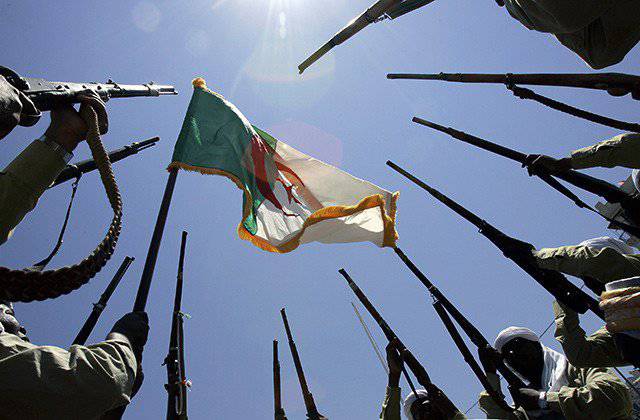
The political life of the last secular state of North Africa
Four years ago, “Arab revolutions” broke out. Starting with the overthrow of the Ben Ali regime in Tunisia, they led to the fall of President Mubarak in Egypt, the destruction of the Jamahiriya (democracy) in Libya, the bloody civil war in Syria, and the armed confrontation in Iraq. Of the countries of North Africa, the secular republican regime resisted then only in Algeria.
North African star
The tribes of Algeria have always offered fierce resistance to foreigners. Already the Roman legions met with repulse of the ancient Libyan-Berber nationalities, which entered into history as "Yugurta wars". In the VII century, Arabs emerged on the territory of modern Algeria, who spread Islam among the local population. Subsequently, the Spaniards tried to gain a foothold here, in the confrontation with which the Algerians take the patronage of the Ottoman Porte. However, the power of the Ottoman Turks in Algeria was fragile and spread to the coastal strip, where the janissary garrisons stood. Thus, the palace of the Turkish ruler Mustafa Pasha, preserved in the city of Algeria, has an underground passage leading to the sea in case of a sudden escape.
At the beginning of the XVIII century, Algeria was finally freed from Turkish rule. But in 1830, French expeditionary forces land here, which the Algerians meet with weapons in hand. The first war of independence under the leadership of Emir Abd El-Kader ended in defeat, but the formation of the national identity of the Algerians took place. Until the end of the XIX century, the uprising against the French were repeated at intervals of 10 — 12 years.
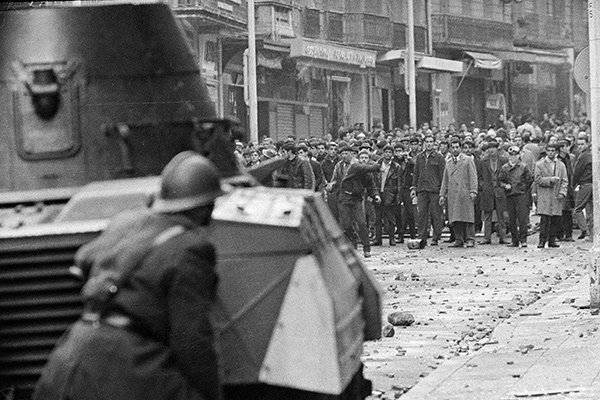
The 1917 revolution of the year in Russia, as we know, awakened the East. In the French colony of Algeria, one way or another, has its own intelligentsia, workers and political culture. In 1920's, the first national organizations were formed here, among them the North African Star Party, the Algerian People’s Party (PAN) and others.
During World War II, many Algerians actively participated in the Resistance Movement, fighting in the French army against the Nazis. Under some secret agreements, Algeria was supposedly promised independence. 8 May 1945, after receiving news of the German surrender, hundreds of thousands of Algerians took to the streets. Among others, the slogans of independence were raised. Riots began, in response the French troops and the police staged a massacre.
In 1954, a small group of six starts an armed struggle for independence. The war, which lasted until the beginning of 1962, claimed the lives of a million and a half people. The violence was mutual: the arrested Algerian underground fighters and the captured partisans were subjected to cruel torture. The overwhelming majority of the victims of the war were civilians. There were repressions in the metropolis: in October 1960, a mass demonstration of immigrants from Algeria against the war took place in Paris. The demonstration was shot, according to some reports, the corpses of the dead were thrown into the Seine.
Characteristically, various forces participated in the national liberation movement. Most of them were secular democrats, largely based on the Soviet experience. The Marxist Franz Fanon, who formed his original ideology of the struggle of the Third World peoples against imperialism, became the main theorist of the Front for National Liberation (FNO). However, in addition to the FNO and its National Liberation Army, the Algerian National Movement (IDA, successors to the North African Star) led by Messali Hadj also led an independent struggle, and also managed to create its own military formations. The ideology of the IDA was a peculiar combination of socialist and communist ideas with Algerian nationalism and even Islam. Between the FLN and the IDA, even during the years of the armed struggle with the colonialists, there was also its own war. And this is despite the fact that one of the leaders of the FLN, Ben Bella, was in the past a member of the Party of the Algerian people and its militarized structure, the Secret Organization. After the victory of the revolution against the participants of the military units of the Algerian national movement began repression, part of its activists emigrated to France. Nevertheless, according to the apocryphal version of the emigrants, the current Algerian flag was designed and first performed by the wife of the IDA leader Messali Haj, a Frenchwoman by nationality.
In 1962, French President Charles de Gaulle was forced to recognize the independence of Algeria.
Thaw and rebuilding in Algeria
The first president of Algeria in 1963 was one of the leaders of the FLN, Ahmed Ben Bella. In Soviet literature, a lot was written about Ben Bela's "left-wing experiments" in economics, about his proximity to Trotskyism. Advisor to Ben Bela was the Greek Michel Pablo who was really well-known in the international Trotsky movement. However, by that time, according to the orthodox followers of Trotsky, Pablo had nothing to do with them and established his own ideology, “Pabloism”. As adviser to Ben Bella, Pablo insisted on more intensive development of workers and rural self-government.
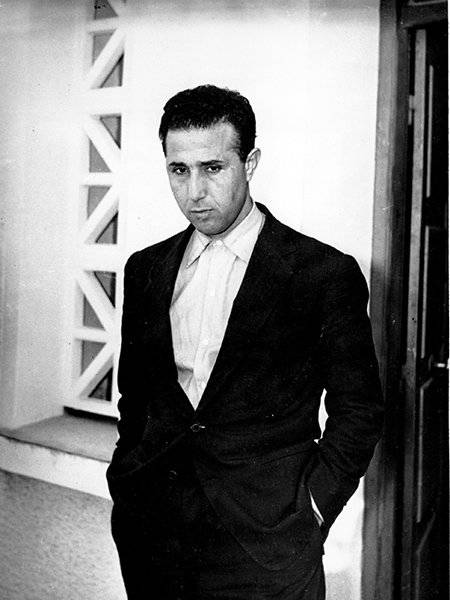
However, the ideology of the FNO and the IDA, which was formed under the strong influence of the French Communists and Trotskyists, was most likely closer to Russian populism than to orthodox Western Marxism.
Soon, in Algeria, apparently under the impression of the events in the Soviet Union, the struggle against the "personality cult" began. In the summer of 1962, demonstrations with banners “No cult of personality!” And “The only hero is the people!” Began to appear on the city streets. In fact, these speeches reflected the heightened contradictions between the TNF factions: the grouping of Mohammed Budiaf and Ait Ahmet and the coalition of Ben Bella and Colonel Boumediene . Then Ben Bella emerged victorious, Budiaf was forced to emigrate. However, economic and managerial experiments cost President Ben Bella dearly: the glory of the “Algerian Khrushchev” was entrenched behind him, and he soon shared the fate of the Soviet “voluntarist”. In 1965, Houari Boumedienne, the minister of defense and a former comrade-in-arms himself, will remove Hero of the Soviet Union Ben Bella from power during a military coup. For all the same accusations of "authoritarianism."
Until the end of 1970, the country firmly adhered to the socialist course. But after the death of Boumediene in 1978, the era of the Algerian stagnation ended, the processes of economic reform were gradually launched, similar to the subsequent Soviet restructuring. Accordingly, problems began to grow in the economy. And increasing economic and political ties with the conservative monarchies of the Persian Gulf led to the growth of religious communities and sentiments. The results were not long in coming, and at the end of the 1980s, certain circles managed to direct social discontent against the “regime of one party”, both under general democratic and Islamist slogans. Street protests, which were started by students and young people, were supported by a variety of parties that operated illegally. But very soon, the dominant positions in the protest movement were seized by the adherents of radical Islam. Their numerous organizations come together in the Islamic Salvation Front (FIS). In 1991, the authorities were forced to go for free elections, of which the FIS declared full victory in the first round. Under pressure from the army, the authorities refused to hold a second round of elections, resulting in a bloody civil war. In many ways, the armed struggle of the Islamist underground was fueled by the exacerbation of the socio-economic situation caused by the reforms launched in the 1990s under the leadership of the International Monetary Fund. During this “black decade”, 200 thousands of people died in Algeria. One of the victims of that war was the president of Algeria, Mohammed Budiaf, in 1992, after the 27 year of exile, invited by the military to the country and attempted to start democratization and fight against corruption. He was killed by his bodyguard, all the circumstances of this attempt have not yet been clarified.
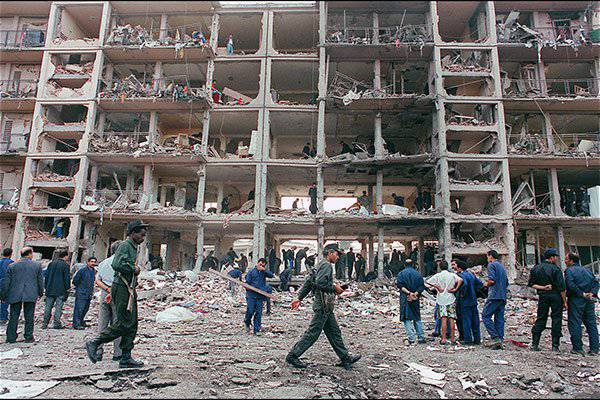
Today, there are different points of view on the harsh reaction to Islamism from the Algerian state, especially the military. The guarantor of secular development is the military, as well as many in the TNF, then they were convinced that in that situation there was no other way out. Certain democratic norms and freedoms had to be sacrificed in order to prevent a much worse reactionary coup. The Algerian Workers Party (PT), which, when it was founded, included some veterans of the North African Star in 1990, for example Mustafa Ben Mohammed, at the time believed that the authorities had made a fatal mistake. Power confrontation with the Islamists led to a further collapse of democracy and unnecessary sacrifices. According to the PT version, it was necessary to fight openly with the movement of politicized Islam, in elections and in residential areas, trying to prove its rightness with real deeds to improve the life of the population. Would the jihadists themselves agree with this agenda?
But really, the success of the Islamists was largely ensured by the fact that they were actively working “from below” on Algerian street. The residential areas of the Arab cities still represent something more than our “sleeping areas”. The spirit of traditional community and neighborhood collectivism is still alive here. And today in such areas of the city of Algeria as Kazba or Bab el Wade, you can see men sitting in the evenings right in front of their houses or inexpensive cafes, and actively discussing local problems. The mosques became the strongholds of the Islamists in the "popular districts". As such they are today. When Friday prayers are held in the mosques of Algeria, it may seem from afar that a real rally is taking place there. Through loud-speaking equipment, the calls of preachers are spread far into the neighborhood. At the same time, the congregation of the congregation, which is being formed around such a mosque, is not just a community of believers - it provides social assistance to those in need, some everyday and vital issues are resolved. And the next stage was the politicization of its members, their involvement in the activities of Islamist structures, including the militant ones.
After the war
The consequences of the war with the Islamists are still evident. And now the streets of Algeria are still patrolled by the police and the National Gendarmerie in blue uniform, like their French counterparts. Many of them are armed with Kalashnikov assault rifles, apparently, delivered to the ADR back in Soviet times. The walls of the numerous barracks of the National People's Army, the building of the security service "Muhabharat" and police stations are covered with barbed wire, surrounded by concrete ridges and metal hedgehogs. For the guards, not just observation towers were equipped here, but real concrete firing points with embrasures, almost DOTS. Similarly, the almost fortified walls of the prison "El-Haraj", built in colonial times.
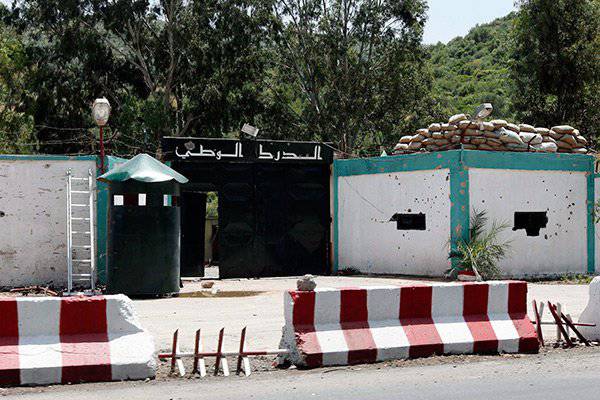
The army and the TNF were victorious in the civil war. Following the military successes of the secular state, there was also a split between moderate and radical adherents of politicized Islam. The irreconcilable radicals are still underground and still have not laid down their arms. Moderate religious figures take part in elections.
The ruling party, confidently with a parliamentary majority, remains the Front for National Liberation. There are different opinions on the transparency and representativeness of the elections. But the fact remains that the largest parties, in one way or another, are represented in the highest legislative body of the AIDR. Thus, the Socialist Front has its own faction in the People’s Assembly (FSS; the word “front” is very popular in the political rhetoric of Algeria) - the Social Democratic Party, which is part of the Socialist International. Secular conservatives are represented by the National Democratic Union. The left party of workers also has in parliament more than two dozen deputy seats. In addition, deputy mandates have several centrist and moderately religious parties. All in all, in Algeria today there are about 60 political factions registered. True, most of them are extremely small entities, often living from election to election (for the election campaign, parties in Algeria are given government grants). Funding of political organizations from abroad is prohibited.
It is also characteristic that in Algeria there are almost no mass media dependent on external sources of funding. One of the influential newspapers remains the organ of the FNO "Mojahed" ("Fighter for Freedom"), which has preserved this name since the 1950-s. There is a cult of the national liberation struggle. Emir Abd El-Kader is recognized as the first national state leader. His equestrian statue adorns the center of Algeria. The highest point of the city is the National Museum of Mujahideen, surmounted by a huge stele. A separate exposition is dedicated to the first underground workers who started an armed struggle on the streets of the city, they have monuments. The ideology of the national liberation revolution is the core of modern Algerian statehood. However, the more time passes after the revolution, the more its ideals collapse. Government leaders increasingly have to take into account the growing influence of Islam. Like ours, the first persons of the country also perform religious rites. In Algeria, it usually happens in the “Great Mosque” by the sea. Ahmed Ben Bela, a radical socialist in the past, on the slope of his years after many decades of house arrest and emigration, also began to position himself as an Islamist.
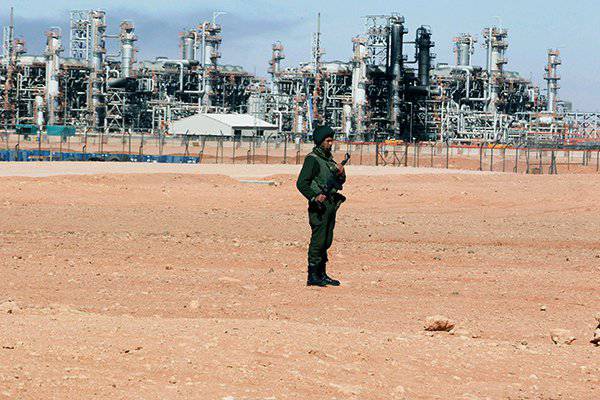
But in the foreign and domestic policy of the ADDR, the principle of independence and the course towards non-alignment remain important. Back in 1960, Algeria withdrew from NATO. However, in the 90s, economic reforms were carried out in the country under the influence of the International Monetary Fund. As a result, the liberalization of the economy led to the closure of a number of enterprises and a drop in the standard of living, and the country was the debtor of the IMF. But today, debts to international funds are almost over, and Algeria has the opportunity to get away from their strict regulations. The country's main industries, the extraction and processing of oil and the export of gas, remain under state control. This allows you to perform many social programs. True, Western experts are often involved as specialists, whereas earlier they were Soviet engineers or national personnel trained with the help of the USSR. Work in the oil and gas industry is considered one of the most highly paid and prestigious in Algeria. But one of the most difficult, so, the work in the red-hot Sahara is carried out exclusively on a rotational basis.
During the reign of President Abdelaziz Bouteflika, who was recently re-elected for a fourth term, a law was passed under which 51% of industrial assets should belong to the state or national capital. First of all, it allows you to maintain control over the strategically important oil and gas spheres. The law 51: 49 is considered a great victory for those factions in the government and other authorities that are in favor of strengthening national sovereignty. Both the PT and the unions came out in support of it. But not everything is so simple. And today Algeria is under tremendous pressure from outside, forcing it to join the WTO. Within the regime itself and the ruling class, these plans have their supporters.
Social Partnership - Eastern Version
On October 12, an international meeting took place in Algeria on the situation in the region, including Palestine. The meeting, which was organized by the Workers' Party, was attended by trade union leaders from Pakistan, India, USA, South Africa, Catalonia, political parties and organizations from France, Palestine and some African states, one delegate represented Russia and Belarus. Following the meeting, a press conference was given. Its participants are confident that today the national sovereignty of Algeria is threatened by serious challenges. The danger comes, of course, from international Islamic fundamentalist organizations, in particular from the "Islamic State" (IG). At the meeting, they said, for example, that the armed forces of the IG launched their massive offensive in Iraq at the very moment when a new intifada could be launched in Palestine. The leadership of not only the ruling, but also some Algerian left and opposition parties are convinced that the so-called Arab revolutions are the American “open East” project, aimed at establishing the notorious “controlled chaos” from Mauritania to Pakistan.
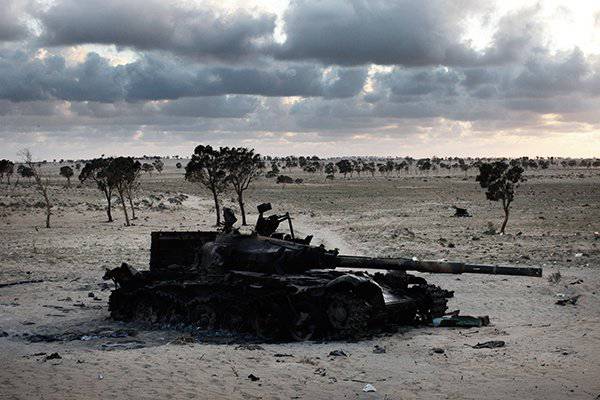
Therefore, the most serious threat is the buildup of the military potential of the West at the approaches to the region. In particular, the proposed creation of new NATO bases in southern Europe. Against which, in Algeria last year, mass protests took place, including with the participation of trade unions and parties of the constructive secular opposition. Without help aviation NATO "rebels" would not have been able to overthrow the Jamahiriya system in neighboring Libya. Thousands of Libyan refugees who poured into Algeria testify to the situation in this country, that it has returned to a state of intertribal medieval strife. In the near future there should be held a large-scale meeting with the participation of various political forces of Libya, dedicated to the settlement in this country. But in the social policy of the Algerian government, certain changes also occur from time to time. In particular, the Ministry of Labor suddenly prepared a draft reform of the labor code, largely as if written off from IMF instructions, despite the country's apparent independence from international financial institutions. Among other things, under the new code it is supposed to allow child labor from 6 years. In response, the General Confederation of Labor (CGT) of Algeria threatened mass mobilization of wage earners, and the government promised to revise the draft. Despite the rather tough nature of state power, which won the civil war and did not allow the recent "color revolutions" in Algeria, the trade unions here are quite powerful, and they listen to their opinion. So, relatively recently organized hired workers have achieved the abolition of an article of the constitution, adopted at the time at the insistence of international financial organizations and limiting the increase in the minimum wage. As a result of the mobilization of workers in Algeria, it was possible to defend 80 thousand jobs in the public sector.
In this environment, it is considered that the national sovereignty of Algeria is closely related to the social rights of its people. Somewhat unusual for Europeans, it may seem that the government of a country where checkpoints and machine gun towers are everywhere can listen to the views of trade unionists or speaking on behalf of party workers. But in the East, a special relationship to the social contract. Perhaps, if the intense canvas of social relations breaks, the consequences can be quite radical.
Death in Atlas
The war here did not go far. A few weeks ago, an ordinary French tourist was abducted in the mountains of Kabylia. 55-year-old pensioner from Nice Herve Gurdel loved to travel, was fond of mountain tourism. In Algeria, it is not customary for foreigners to visit their country on their own, without local escort. This is due to customs and the complexity of the political situation in the country. Hervé Gurdel went to the Atlas Mountains, accompanied by his Algerian acquaintances, but this did not help him, almost immediately he was abducted. Responsibility was assumed by the Jund al-Khalifat grouping, which was previously almost unknown. Another unusual circumstance is that until this day, all Islamist groups operating in Algeria have declared their proximity to Al-Qaeda. The thieves of the French tourist declared their links with the Islamic State.
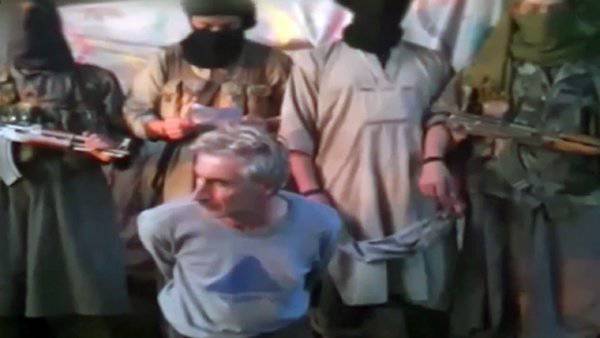
Another oddity: as reported by independent French journalists, they are well aware that French citizens are still buying back. However, the kidnappers quickly killed the hostage. What for? For example, a banal ransom was not included in their goals. But the alleged political blackmail of the French state about its participation in the operation against the ISIS in this case also looks almost meaningless: the French authorities simply did not have time. But the French military operation in the East immediately received serious justification. In France, public opinion is currently being actively processed regarding the military invasion of Syria and Iraq: officially against the "Islamic State" and under the slogan "War against Barbarism." One of its results was the fact that even the traditionally opposed "imperialist interventions" of the Communist Party of France now supports such actions.
At the same time, many in Algeria, Palestine, Syria and Iraq believe that the fight against terrorism in this case is only a well-directed cover. And the true goal of declaring war on the IG, which during its struggle against the regime of the Ba'ath Party and Bashar Assad in the West was strongly supported, is in fact a new invasion of the region and an attempt to establish Western military control there.
Fortress Algeria
The role of radical Islam in Algeria, as in the world as a whole, is very significant today. On the one hand, it is a response to the challenges of globalization and all its devastating effects, both for national economies and for the identity of national cultures. Politicized Islam looks like an ideology that is successfully perceived as a social alternative in the minds of the majority of the inhabitants of the East. At the same time, the economic doctrine of Islamism, unlike political and religious, does not imply any radical changes, the “sacred” private property of wealthy Muslims and even the interests of world market players do not undergo any significant changes under his rule.
But the secular regime of Algeria, with the active support of the armed forces, is still a significant factor in the stability of the region. What are the reasons for its sustainability? First, in Algeria there are deep traditions of the national liberation struggle, secular and left-wing nationalism is still a serious competitor to Islamism. Secondly, the country managed to maintain state and national control over key resources, oil and gas, large industry, as well as to limit foreign influence on the media and political parties. Thirdly, the multi-party system of Algeria, influential trade unions and, in one way or another, the ongoing elections, partially relieve social tensions in society. At the same time, the security forces rigidly oppose religious extremism and do not allow uncontrollable political processes. Fourth, after the collapse of the Soviet Union, Algeria had a new major foreign policy ally, France. It is not in her national interest to allow serious destabilization in this country. At least for now.
But the main guarantee of stability and at the same time a battlefield is the consciousness of ordinary Algerians. Their confidence in the future, their ability to protect their social rights and interests on a daily basis, their ability to distinguish positive changes from demagogic doctrines and destructive plans imposed from outside, above all, can save the country from slipping to chaos.
Information